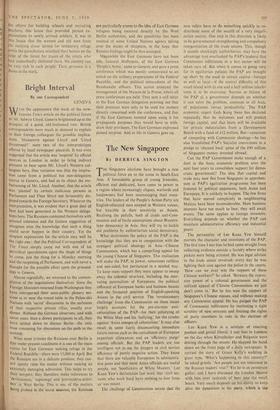Bright Interval
By our Correspondent
GENEVA
Wt at the appearance this week of the now- famous Times article on the political future ol Mr. Selwyn Lloyd, Geneva brightened up at the Prospect of a good, old-fashioned row. British correspondents were much in demand to explain to their foreign colleagues the possible implica- tions. 'Manceuvre against Lloyd' and 'Lloyd threatened?' were two of the interpretations offered by local newspaper placards. It was even suggested that the article was 'inspired' by official sources in London in order to bring indirect pressure to bear upon Mr. Lloyd's Western col- leagues here. One variation was that the inspira- tion came from a political but non-delegation source in Geneva, and had as its object the ,em- barrassing of Mr. Lloyd. Another, that the article was 'planted' by certain malicious persons in Parliament and Fleet Street not favourably dis- posed towards the Foreign Secretary. Whatever the interpretation, it was evident that a great deal of heat had been generated in the Western delega- tions here. The Russians contented themselves with amused tolerance and the faintest suggestion of smugness over, the knowledge that such a thing could never happen in their country. Yet the simplest explanation for the article may well be the right one : that the Political Correspondent of The Times simply came out with one of his Periodical speculations upon the shape of things to conic, just the thing for a Monday morning and the reopening of Parliament, and with never a thought for the possible effect upon the proceed- ings in Geneva.
Almost regretfully, we returned to the contem- plation of the negotiations themselves. Since the Foreign Ministers returned from Washington they have interspersed their semi-public plenary ses- sions at or near the round table in the Palais des Nations with 'secret' discussions in the seclusion of their respective private villas, usually over dinner. Without the German observers, and with never more than a dozen participants in all, they have settled down to discuss Berlin—the only issue remaining for discussion on the path to the summit.
What most irritates the Russians over Berlin is that under present conditions it is one of the main routes for East Germans seeking refuge in the Eederal RepUblic—there were 15,000 in April. But the Russians are in a delicate position; they can- not openly raise the matter without making an extremely damaging admission. This helps to try their tempers; they therefore make references to deviationists,"espionage' and 'provocative activi- ties' in West Berlin. This is one of the matters being probed in the secret sessions; the Russians are particularly averse to the idea of East German refugees being received directly by the West Berlin authorities, and the possibility has been mooted of some United Nations agency taking over the duties of reception, in the hope that Russian feelings migh't be thus assuaged.
Meanwhile the East Germans have not been idle. General Hoffmann, of the East German 'People's Army,' came to Geneva, and gave a press conference which was mostly consecrated to an attack on the military preparations of the Federal Republic, and the political antecedents of the Bundeswehr officers. This action annoyed the management of the Maison de la Presse, where all press conferences are held. They sent a stiff letter to the East German delegation pointing out that their premises were only to be used for matters directly concerned with the conference, and that if the East Germans insisted upon using it for propaganda purposes they would have to with- draw their privileges. The East Germans expressed pained surprise. And so life in Geneva goes on.






































 Previous page
Previous page